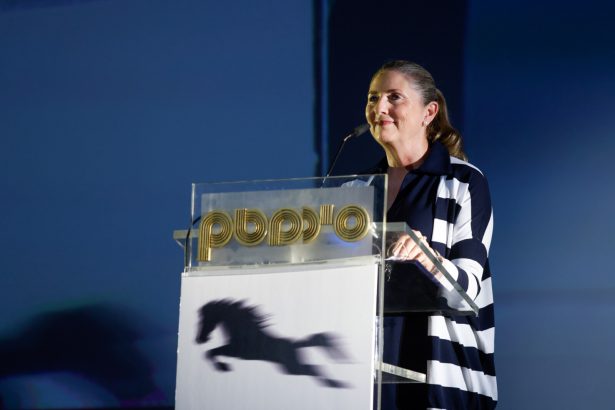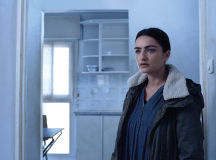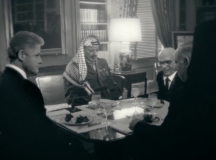Tal Kra-Oz is a writer based in Tel Aviv. His work has appeared in Tablet Magazine, The Forward and Fathom.
This summer’s Jerusalem Film Festival was an exhilarating return to normalcy. Two years ago, the 2020 fest was delayed in light of the pandemic and was eventually forced to move online. The following summer, Israelis clad in surgical masks cautiously dipped their toes in the Jerusalem Cinematheque, although international guests still weren’t allowed into Israel. But in July 2022, attendees from around the country and the world were back in full force for the festival’s 39th edition. They were eager to sample recent highlights from festivals like Cannes and the Berlinale, alongside an intriguing selection of Israeli premieres, including several standout documentaries.
That newfound normalcy went beyond the welcome return to public health. For much of the past decade, the festival was an unfortunate ground zero for the country’s culture wars. The former Minister of Culture, Miri Regev (Likud) used the opening ceremonies to launch initiatives that introduced new, politically-minded considerations into public funding for the arts. No matter that said public funds, as administered by non-partisan industry professionals who selected projects on their artistic merits, were the main driver of the renaissance of contemporary Israeli cinema; never mind that Regev’s initiatives were tailor-made to score points with primary voters. She created a climate wherein Israel’s state lottery, Mifal Hapais, announced in 2019 that it would discontinue its funding of a generous prize for documentaries, after it had been awarded to a film about an Israeli lawyer who represents Palestinians accused of violent acts.
Regev’s successor, Chili Tropper (Blue and White), seems to actually appreciate the arts and respect artists. His tenure has not been without some controversy: earlier this year he attended the inaugural Samaria Film Festival in the West Bank town of Ariel, kicking off the new Shomron Film Fund, a Regev initiative intended to bankroll projects led by settlers and/or filmed in the Occupied Territories. But gone are the barbed diatribes against liberal Israeli filmmakers, and the threats to withhold funds from those who stubbornly refuse to fall in line.
Case in point: Two Kids a Day, a powerful documentary by David Wachsmann and as strong an indictment against Israel’s occupation of the West Bank as you are likely to encounter, received funding from both the Ministry of Culture and the state lottery. The film, which premiered at the festival, is a forensic examination of how the IDF deals with the Palestinian youth responsible for spontaneous but potentially lethal actions like hurling stones at passing vehicles.
Even if you ultimately reject the film’s radical thesis–that the arrest of Palestinian kids, often followed by their trial and imprisonment, is a policy designed to break the resolve of each new generation–you will no doubt find it a compelling watch. Many similarly-themed documentaries are populated with born-again Breaking the Silence-types, eager to condemn the very practices they once espoused while in uniform. Most of the interviewees in Wachsmann’s film, however, still sleep well at night, to quote one of the speakers, a former police investigator. Their words–interspersed with footage of actual police investigations of kids and interviews with the same kids after their release from prison–paint a deeply troubling portrait of a seemingly implacable moral tragedy.
A recurring theme across several festival offerings was a protagonist-shaped hole in their heart. Women and men who would no doubt have made for formidable documentary subjects in their lifetimes (in the not-always-likely event they would have agreed to be interviewed on camera), instead became absences haunting films made years after their passing. The methods employed by the filmmakers in wrestling with those absences are especially worth examining.
Even in a country where almost anyone over a certain age seems to have a story worthy of a movie, The Partisan with the Leica Camera manages to surprise. It tells the story of Mundek and Hannah Lukawiecki, a tight-lipped elderly couple that lived in a quiet Ramat Gan apartment building. They told almost no one about the years they spent as partisans in the forests of southeastern Poland, killing Germans but also Polish and Jewish collaborators. Ruth Walk’s film follows the Lukawiecki’s son Simon in his attempts to make sense of who his parents were, armed with little more than a trove of photographs left behind by Mundek.
Zohar Wagner, a beloved Israeli filmmaker best known for a series of intensely personal, autobiographical films, recently began applying her idiosyncratic techniques to telling other people’s stories. Savoy is about an infamous 1975 terrorist attack, when a group of PLO terrorists took over the eponymous Savoy Hotel in Tel Aviv, taking staff and guests hostage. A failed IDF rescue operation ended with most of the hostages and terrorists dead, along with three of the soldiers (it was soon eclipsed the following year by the far more successful Entebbe mission).
Rather than recount the doomed heroics of the elite commando operation, Wagner homes in on the story of one of the hostages, Kochava Levi–that night’s unsung hero. Fluent in both Hebrew and Arabic, she facilitated the negotiations between the Israeli authorities and the terrorists, unknowingly buying time for the rescue mission. In the aftermath of the massacre of which she was one of the sole survivors she was slandered by the press as a prostitute and never received the recognition she deserved. Levy died three years ago, but Savoy restores her dignity and then some, not least thanks to her portrayal in dramatised re-enactments by Dana Ivgy, one of our greatest actresses. And even though parts of the docu-drama are reminiscent of action fare like Fauda, the documentary footage (including audio recordings of Levi’s negotiations) make a case for the Savoy’s place in the sad annals of the conflict.
Egypt, A Love Song employs similar methods–archival footage, dramatic reenactments, family members on a quest to understand their late relative–to masterful effect. When I interviewed its director, Iris Zaki, after the release of her previous film Unsettling, she offhandedly told me about her almost unbelievably unique family. Luckily enough, I had forgotten most of the details and turns by the time I sat down to watch the resulting film four years later.
I mostly remembered that Zaki’s paternal grandmother, Souad Zaki, was a Jewish-Egyptian chanteuse, a contemporary of the great Umm Kulthum, and that her grandfather was a Muslim man. The story of how her grandmother found her way to Israel, where she worked as a janitor in government offices and moonlighted on the Arab-language public radio, has the soapy twists and turns of a classic Egyptian melodrama, of the sort they used to broadcast here on Friday afternoons. Zaki cannily decided to direct the re-enactments peppered throughout her film in the style of those movies. The result is a loving tribute to a grandmother Iris Zaki didn’t fully know, but also a surprisingly moving tribute to her own father. The film teaches us that even if the attempt to know the unknowable doesn’t stand a chance, there is still much to be gained in the effort.





































